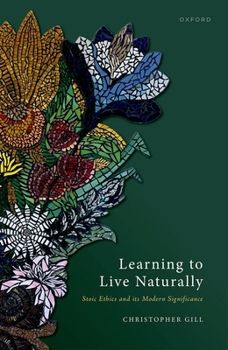Learning to Live Naturally: Stoic Ethics and Its Modern Significance
At a time of unprecedented interest in Stoicism among scholars and the general public, this book offers a sustained examination of the core Stoic ethical claims and their significance for modern moral theory. The first part considers the Stoic ideas of happiness as the life according to nature and virtue as expertise in leading a happy life and explores the senses of 'nature' (both human and universal) relevant for ethics. The second part studies Stoic thinking on ethical development (learning to live naturally), bringing out the interconnections between growth in ethical understanding, forming social relationships, and emotional responses. The third part discusses how Stoic ethics, as interpreted here, can contribute to contemporary moral theory, especially virtue ethics. It suggests that Stoic thinking on the virtue-happiness relationship offers a cogent alternative to Aristotle, currently the main ancient prototype for virtue ethical theory, and it explores ways in which Stoic ideas on human and universal nature can contribute to modern ethical debates, notably on how to respond effectively to the pressing challenge of climate breakdown. It also highlights the value of Stoic guidance for virtue ethics as well as contemporary 'life-guidance'. A further distinctive feature of the book is the close and extended study of key sources for Stoic ethics, including Cicero's On Ends and On Duties, which enables readers of different kinds to interpret these source for themselves.
Format:Hardcover
Language:English
ISBN:019886616X
ISBN13:9780198866169
Release Date:February 2023
Publisher:Oxford University Press
Length:384 Pages
Weight:1.55 lbs.
Dimensions:1.6" x 6.3" x 8.8"
Related Subjects
PhilosophyCustomer Reviews
0 rating





